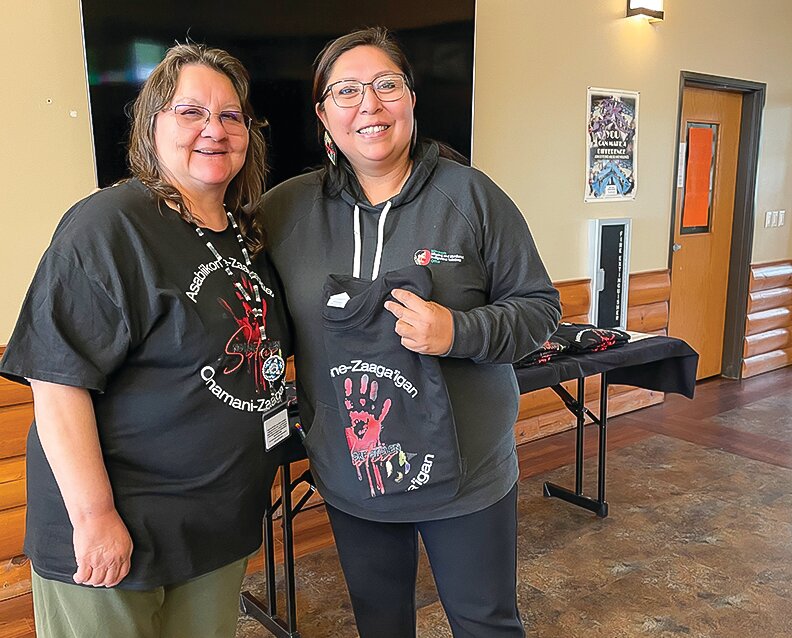Support the Timberjay by making a donation.
Events held to raise awareness of human trafficking
VERMILION RESERVATION- About two dozen youth and adults walked here recently to raise awareness of the issues of human trafficking and missing and murdered Indigenous relatives. A companion event was …
This item is available in full to subscribers.
Attention subscribers
To continue reading, you will need to either log in to your subscriber account, below, or purchase a new subscription.
Please log in to continue |
Events held to raise awareness of human trafficking
VERMILION RESERVATION- About two dozen youth and adults walked here recently to raise awareness of the issues of human trafficking and missing and murdered Indigenous relatives. A companion event was held simultaneously at Nett Lake.
The walks were a prelude to an all-day conference focused on human trafficking, organized by Bois Forte Victim Services Coordinator Muriel Deegan. The conference, set for Thursday, June 13 from 9 a.m. – 4 p.m. at Fortune Bay, is free and open to the public, and lunch will be served. For more information, contact Muriel at Muriel.deegan@boisforte-nsn.gov, or call 218-410-3832.
“There is no one type of trafficking victim,” Deegan wrote, “traffickers prey on the vulnerable behind hidden doors.”
Violence is a health care issue, and current research shows that an average of 40-percent of women involved in sex trafficking are Native American or Alaskan Native. Homicide is the third leading cause of death for Native girls and women aged A15-24.
Tawny Savage, the violence prevention coordinator for the newly formed Minnesota Missing and Murdered Indigenous Relatives Office (MMIR), said her outreach efforts consist of a lot of time spent with high school students. The problem of missing women is ongoing and often not in public view. There were 62 teens and women missing in Minnesota in January alone, she said.
Savage said one of the most important things when a loved one is missing is time. Families need to contact law enforcement immediately, and not wait. They need to provide detailed information.
“Law enforcement agencies are required to take the report,” she said. “There is no required waiting period to file a missing person’s report.”
Savage attended the event as part of her outreach efforts. She is based in northern Minnesota, and works with tribes along with her work with youth.
A Vermilion resident who participated in the walk talked about a friend of hers, Sheila St. Clair, from Fond Du Lac, who went missing over eight years ago in Duluth.
“I was one of the last people who saw her,” said Isabelle Larson, who said her friend had just had surgery and was recently released from the hospital.
Larson said there were a few times when law enforcement thought they had found St. Clair’s body, but then it turned out not to be her. “That was so hard,” Larson said.
Savage said that when someone is missing, there needs to be a coordinated response from many different agencies, not just law enforcement, but also child protective services and social workers.
“Families are the best advocates,” she said. “Law enforcement needs to take their reports seriously.”
The historical distrust of law enforcement in Native communities is a hurdle that needs to be overcome, she said. “This is something our office is working on. We need to work together.”
The MMIR office also has a reward fund, “Gaagige-Mikwendaagoziwag” means “they will be remembered forever.” The fund offers rewards for information on missing and murdered Indigenous women, children, and Two-Spirit relatives.
Support and resources are now available from the new statewide office at mmiroffice.dps@state.mn.us or online at dps.mn.gov/divisions/ojp/mmir/Pages/about.aspx.
Gov. Tim Walz signed into law the legislation to establish the first-in-the-nation MMIR Office in 2021. Staff are housed in the Department of Public Safety Office of Justice Programs (OJP) and will work to implement the recommendations of the MMIW Task Force.
Report suspected
human trafficking
If you or someone you know is in immediate danger of being trafficked, call 911.
To report a suspected trafficking situation, call the BCA at 1-877-996-6222 or email bca.tips@state.mn.us.






